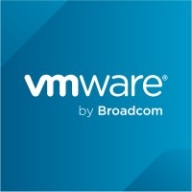

VMware vSAN and Hitachi Unified Compute Platform HC Series compete in the hyper-converged infrastructure market. VMware vSAN has the upper hand in pricing and support, while Hitachi HC Series is stronger in performance and reliability.
Features: VMware vSAN integrates seamlessly with the VMware ecosystem, offers easy scalability, and provides efficient storage policy management. Hitachi HC Series offers advanced data protection features, scalability, and analytics capabilities for in-depth monitoring and optimization.
Ease of Deployment and Customer Service: VMware vSAN simplifies deployment through integration with VMware environments. Hitachi HC Series has a comprehensive deployment model with robust customer support for smoother operations.
Pricing and ROI: VMware vSAN is cost-effective and provides good ROI for budget-conscious organizations. Hitachi HC Series involves higher initial costs with premium features and superior ROI in performance-intensive settings.
| Product | Market Share (%) |
|---|---|
| VMware vSAN | 11.4% |
| Hitachi Unified Compute Platform HC Series | 0.9% |
| Other | 87.7% |

| Company Size | Count |
|---|---|
| Small Business | 100 |
| Midsize Enterprise | 58 |
| Large Enterprise | 129 |
Hitachi Unified Compute Platform (UCP) is the company's product for converged infrastructure (CI), combining resources server, storage, networking, virtualization, and software management.
VMware vSAN is a software-defined storage product that is used in collaboration with VMware ESXi hypervisor and that provisions and manages storage based on policies, regardless of the underlying hardware. The solution enables you to prime your business for growth through its seamless evolution (it is integrated with vSphere and requires no new tools), its flexibility, and its multi-cloud capabilities. As an industry-leading software, VMware vSAN provides high levels of performance with minimal impact on CPU and memory.
VMware vSAN Features
VMware vSAN has many valuable key features. Some of the most useful ones include:
VMware vSAN Benefits
There are many benefits to implementing VMware vSAN. Some of the biggest advantages the solution offers include:
Reviews from Real Users
Below are some reviews and helpful feedback written by PeerSpot users currently using the VMware vSAN solution.
PeerSpot user Yves S., CEO, Cloud Evangelist at Comdivision Consulting GmbH, says, “vSAN gives us a lot of advantages when we need to expand resources. We have an overall larger host infrastructure, and we split that up for specific customer test and use cases. In that specific scenario, we can easily add more hosts or reduce the number of hosts in the environment.”
A reviewer who works in Infrastructure Security explains, “The ease of use is great. The initial setup and upgrade process was pretty straightforward. And, technical support is great.”
Laurent N., Director at Softlogic, comments, "The feature that I have found most valuable is that it is easy to deploy. It is easy to create and delete virtual servers. It is easy to create the load balancing and the clustering."
We monitor all HCI reviews to prevent fraudulent reviews and keep review quality high. We do not post reviews by company employees or direct competitors. We validate each review for authenticity via cross-reference with LinkedIn, and personal follow-up with the reviewer when necessary.